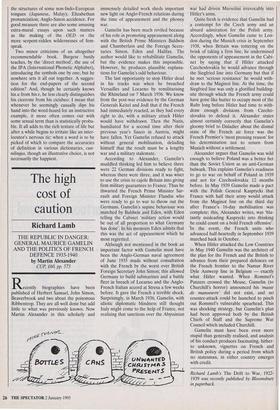The high cost of caution
Richard Lamb
THE REPUBLIC IN DANGER: GENERAL MAURICE GAMELIN AND THE POLITICS OF FRENCH DEFENCE 1933-1940 by Martin Alexander CUP, £60, pp. 573 Recently biographies have been published of Herbert Samuel, John Simon, Beaverbrook and two about the poisonous Ribbentrop. They are all well done but add little to what was previously known. Now Martin Alexander in this scholarly and
immensely detailed work sheds important new light on Anglo-French relations during the time of appeasement and the phoney war.
Gamelin has been much reviled because of his role in promoting appeasement along with the British Prime Ministers Baldwin and Chamberlain and the Foreign Secre- taries Simon, Eden and Halifax. The author would like to rehabilitate Gamelin, but the evidence makes this impossible. However, he produces plausible explana- tions for Gamelin's odd behaviour.
The last opportunity to stop Hitler dead in his tracks was when he breached Versailles and Locarno by remilitarising the Rhineland on 7 March 1936. We know from the post-war evidence by the German Generals Keitel and Jodl that if the French had immediately reacted, as they had every right to do, with a military attack Hitler would have withdrawn. Then the Nazis, humiliated for a second time after their previous year's fiasco in Austria, might have fallen. Yet Gamelin refused to attack without general mobilisation, deluding himself that the result must be a lengthy war and a military stalemate.
According to Alexander, Gamelin's muddled thinking led him to believe there were 22 German divisions ready to fight, whereas there were three, and it was wiser to use the crisis to cajole Britain into giving firm military guarantees to France. Thus he thwarted the French Prime Minister Sar- rault and Foreign Minister Flandin who were ready to go to war to throw out the Germans. Gamelin's supine behaviour was matched by Baldwin and Eden, with Eden telling the Cabinet 'military action would be out of all proportion to what Germany has done'. In his memoirs Eden admits that this was the act of appeasement which he most regretted.
Although not mentioned in the book an important factor with Gamelin must have been the Anglo-German naval agreement of June 1935 made without consultation with the French by the worst ever British Foreign Secretary John Simon; this allowed Germany to build submarines and a battle fleet in breach of Locarno and the Anglo- French Italian accord at Stresa a few weeks before. It gave the French a terrible shock. Surprisingly, in March 1936, Gamelin, with idiotic diplomatic blindness still thought Italy might come to the help of France, not realising that sanctions over the Abyssinian war had driven Mussolini irrevocably into Hitler's arms.
Quite fresh is evidence that Gamelin had a contempt for the Czech army and an absurd admiration for the Polish army. Accordingly, when Gamelin came to Lon- don during the Munich crisis in September 1938, when Britain was tottering on the brink of taking a firm line, he undermined the opponents of appeasement in the Cabi- net by saying that if Hitler attacked Czechoslovakia he would advance through the Siegfried line into Germany but that if he met 'serious resistance' he would with- draw to the Maginot line. At the time, the Siegfried line was only a glorified building- site through which the French army could have gone like butter to occupy most of the Ruhr long before Hitler had time to with- draw enough divisions from Czecho- slovakia to defend it. Alexander states almost certainly correctly that Gamelin's gloomy brief to Daladier about the dismal state of the French air force was the French Premier's 'most pressing reason' for his determination not to return from Munich without a settlement.
Alexander argues that Gamelin was wild enough to believe Poland was a better bet than the Soviet Union as an anti-German bulwark. This explains Gamelin's readiness to go to war on behalf of Poland in 1939 and not for Czechoslovakia 12 months before. In May 1939 Gamelin made a pact with the Polish General Kasprycki that France with half their army would attack from the Maginot line on the third day after France's 16-day mobilisation was complete; this, Alexander writes, was `bla- tantly misleading Kasplycki into thinking he could count on a bold French offensive'. 'In the event, the French units who advanced half-heartedly in September 1939 marched back in October.
When Hitler attacked the Low Countries in May 1940 Gamelin was the architect of the plan for the French and the British to advance from their prepared defences on the French frontier to the Namur River Dyle Antwerp line in Belgium — exactly what Hitler wanted. When Rommel's Panzers crossed the Meuse, Gamelin (to Churchill's horror) announced his 'masse de manoeuvre' did not exist, and no counter-attack could be launched to pinch out Rommel's vulnerable spearhead. This was shocking strategy, but Gamelin's plan had been approved both by the British Chiefs of Staff and the Supreme War Council which included Churchill.
Gamelin must have been even more stupid than generally realised, and analysis of his conduct produces fascinating, hither- to unknown, vignettes on French and British policy during a period from which no statesman, in either country emerges with credit.
Richard Lamb's The Drift to War, 1922- 1939 was recently published by Bloomsbury in paperback










































 Previous page
Previous page